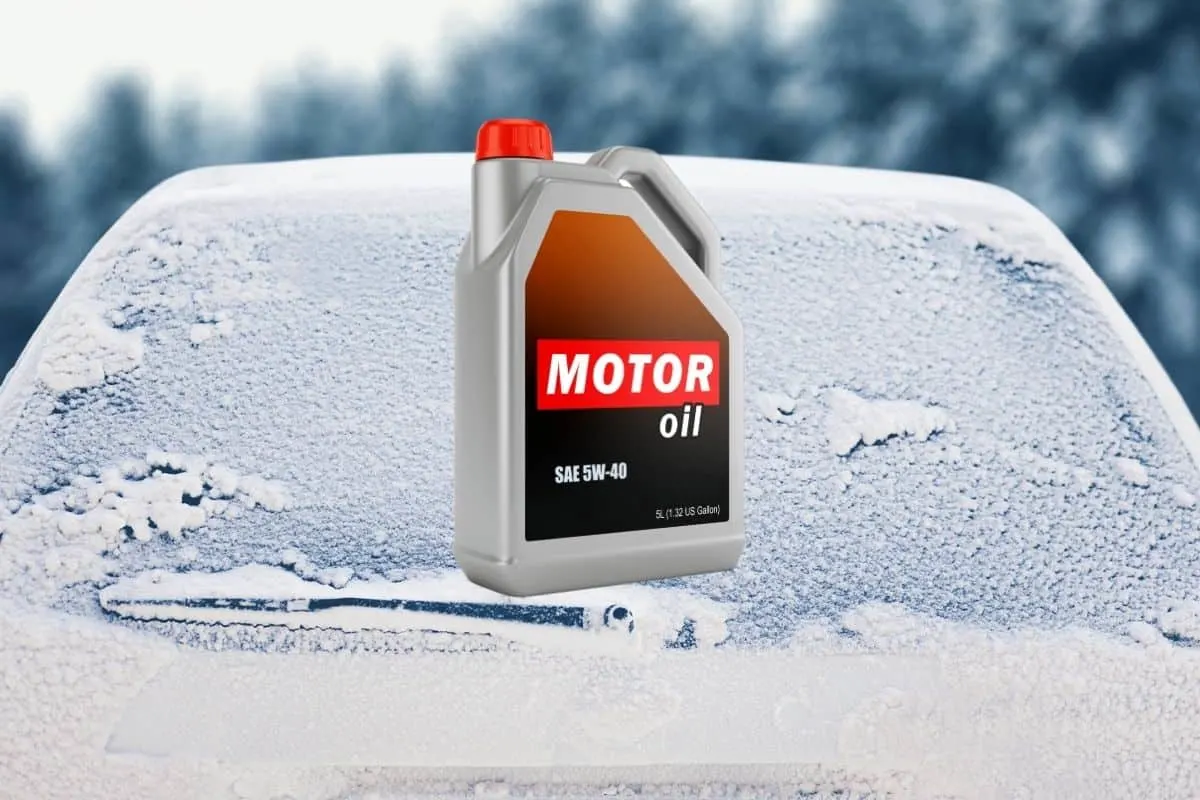For motor oil to function as intended, it needs to have a specific viscosity.
If the oil is too thin, it doesn’t offer adequate protection to the engine. Too thick, and it makes it difficult for the engine to start.
So what happens to motor oil when it’s freezing outside? Does it freeze up solid like water or stay liquid longer, like gasoline?
Motor oil is petroleum that does not freeze solid but instead thickens at freezing temperatures. Although it doesn’t solidify or crystalize, it loses the fluidity that enables it to flow through the engine and provide necessary lubrication.
As motor oil thickens, it doesn’t move effectively, posing a risk of damage to the engine components in low temperatures.
Read on to learn more about the effect of freezing conditions on motor oil.

What Temperature Does Motor Oil Freeze?
Motor oil doesn’t freeze when temperatures drop. However, the consistency and texture become almost solid, preventing it from flowing.
At 0 degrees Fahrenheit (-18 degrees Celsius), the oil doesn’t flow as smoothly as it should.
Friction in the oil increases due to the molecules getting bound together.
These molecules are more resistant to flow.
Motor oil has a property referred to as pour point.
The pour point of any oil is the lowest possible temperature where the oil pours when the container gets tilted at a certain angle under normal conditions.
Most oils become as thick as maple syrup at 20 degrees Fahrenheit (-7 degrees Celsius). However, every oil has a spec sheet that shows its specific pour point.
Conventional Oil
Conventional motor oil has some wax components, which is what allows the oil to become thicker in cold weather.
The thicker it becomes, the harder it becomes to flow through the engine.
At temperatures below -4 degrees Fahrenheit (-20 degrees Celsius), the mineral base oils in conventional motor oil fail to function efficiently.
Synthetic Oil
Synthetic oils lack the wax present in conventional motor oil.
These oils also have a high viscosity index which refers to how viscosity changes due to a temperature change.
Synthetic oils can function effectively at very low temperatures, even below -20 degrees Celsius (-4 degrees Fahrenheit).
They have a pour point of -50 degrees Celsius (-58 degrees Fahrenheit).
Synthetic oils have an excellent flow rate and can maintain low viscosity even when the engine is cold.
Due to the chemical composition, these oils don’t quickly freeze or get congealed.
How Long Does It Take Motor Oil To Freeze?
Motor oil doesn’t freeze in sub-zero temperatures, but it thickens, making it more challenging to start the engine.
An engine becomes cold after sitting idle for an extended period, often overnight.
The motor oil inside the engine becomes cooler and denser overnight.
When you start the engine in the morning, the thickened oil doesn’t flow as it should under average temperatures.
Conventional motor oil becomes thicker than synthetic oil.
What Happens When Motor Oil Freezes?
Motor oil doesn’t freeze to a solid form, as there’s no crystallization. It gets denser and resists the flowing motion.
The oil loses the energy it needs to move effectively or fails to move completely.
In such a case, there is no lubrication between the engine components. The battery has to overwork to pump the motor oil to other parts in the engine block.
This extra strain weakens the battery in cold conditions.
Cold engine oil causes grinding and abrasion, which wears the engine.
The thickened oil also blocks some pathways, denying the engine components vital lubrication.
The result is total engine failure or expensive repair costs.
Additionally, since cold engines take longer to heat up, there is increased fuel consumption and minimal fuel efficiency.
Can Motor Oil Be Stored Outside in the Winter?
It’s not advisable to store motor oil outside in freezing temperatures.
Motor oil and gasoline storage should always be in an environment with stable temperatures.
Too much heat or cold affects the oil’s chemical composition and reduces its efficiency and performance.
Those of us who live in a place susceptible to extreme weather should avoid storing motor oil in our trunks or garage.
For motor oil already in the car, it’s advisable to buy the recommended type for winter driving.
Lower viscosity grades are an indication that the oil is capable of functioning effectively in cold conditions.
It would be best to also consider winterizing your car.
Coolants or antifreeze products assist in preventing the vehicle’s engine from freezing even when left outside.
Before purchasing these products, verify with the owner’s manual to get the manufacturer’s recommended formulation.
What Are the Effects of Increased Oil Viscosity?
Increased viscosity restricts motor oil’s flow rate throughout the engine.
Besides the circulation system, the gearbox also takes a hit when motor oil becomes too thick.
The submerged portion of the gear is unable to push congealed motor oil to the other engine components.
Increased viscosity also results in the need for a higher torque to start up the engine.
As the load increases, too much energy gets consumed due to the extra friction, or the engine suffers severe damage.
In extremely low temperatures, the base oils within the oil can stratify to form different levels.
The additives present in the oil also become insoluble and get separated from the base oils, and accumulate at the sump’s bottom.
These additives are vital, but the motor oil is no longer effective if they accumulate as sludge at the bottom.
Frequently Asked Questions (FAQs)
Can Motor Oil Already in Your Car Freeze?
As a petroleum product, motor oil is not capable of freezing, so it won’t freeze once it’s in your car. It coagulates and gets thicker, making it difficult to flow through the engine.
Synthetic oils function better in cold weather compared to conventional motor oils.
Does Motor Oil Go Bad If Frozen?
When exposed to freezing temperatures, the chemical properties of motor oil can deteriorate.
As a result, the oil becomes ineffective and doesn’t offer proper protection to the engine parts.
What Is the Most Appropriate Motor Oil for Use in Winter?
During the winter months, it’s advisable to use winter-grade oil. It’s lighter and flows better without becoming sluggish.
Motor oil that has the letter W in the title is the best option.
Motor oil doesn’t freeze to a solid-state in extremely low temperatures, but it fails to circulate well.
Therefore, any movement in the engine components can break some parts, such as the oil pump or the drive mechanism.
To avoid such issues with your engine, consider selecting motor oil that’s light in weight or winter-grade oil for colder seasons.
To determine the oil’s viscosity, you can read the oil’s label. Winter-grade oils have a specific tag, marked using the letter W on the title.
